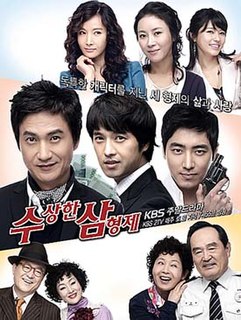| Sung-mi | |
| Hangul | 성미 |
|---|---|
| Hanja | |
| Revised Romanization | Seong-mi |
| McCune–Reischauer | Sŏngmi |
Sung-mi, also spelled Seong-mi or Song-mi, is a Korean feminine given name. Its meaning differs based on the hanja used to write each syllable of the name. There are 27 hanja with the reading "sung" and 33 hanja with the reading "mi" on the South Korean government's official list of hanja which may be registered for use in given names; they are displayed in the table at right. [1]

Hanja is the Korean name for Chinese characters. More specifically, it refers to the Chinese characters borrowed from Chinese and incorporated into the Korean language with Korean pronunciation. Hanja-mal or Hanja-eo refers to words that can be written with Hanja, and hanmun refers to Classical Chinese writing, although "Hanja" is sometimes used loosely to encompass these other concepts. Because Hanja never underwent major reform, they are almost entirely identical to traditional Chinese and kyūjitai characters, though the stroke orders for some characters are slightly different. For example, the characters 教 and 研 are written as 敎 and 硏. Only a small number of Hanja characters are modified or unique to Korean. By contrast, many of the Chinese characters currently in use in Japan and Mainland China have been simplified, and contain fewer strokes than the corresponding Hanja characters.
Seong, also spelled Song or Sung, is an uncommon Korean family name, a single-syllable Korean given name, as well as a common element in two-syllable Korean given names. The meaning differs based on the hanja used to write it.
People with the name include:
- Hong Sung-mi (born 1986), stage name Dana (South Korean singer)
- Michelle Wie (Korean name Wie Seong-mi, born 1989), American golfer of Korean descent
- Yun Song-mi (born 1992), North Korean football defender

Hong Sung-mi, known professionally as Dana, is a South Korean singer and musical actress and vocal coach. She was originally a solo singer, debuting in 2001, and later debuted as a member of South Korean girl group The Grace in 2005.

Michelle Sung Wie is an American professional golfer who plays on the LPGA Tour. At age 10, she became the youngest player to qualify for a USGA amateur championship. Wie also became the youngest winner of the U.S. Women's Amateur Public Links and the youngest to qualify for an LPGA Tour event. She turned professional shortly before her 16th birthday in 2005, accompanied by an enormous amount of publicity and endorsements. She won her first major at the 2014 U.S. Women's Open.
Yun Song-mi is a North Korean football defender who played for the North Korea women's national football team at the 2012 Summer Olympics. At club level, she played for Pyongyang City.
Fictional characters with the name include:
- Ji Seong-mi, character played by Im Seo-yeon in 2009 South Korean television series Three Brothers
- Ma Seong-mi, character played by Kim Min-hee in 2012 South Korean television series I Do, I Do
- Sungmi, character played by Naomi Ko in 2014 American satirical drama film Dear White People

Three Brothers is a 2009 South Korean television series starring Ahn Nae-sang, Oh Dae-gyu, Lee Joon-hyuk, Park In-hwan, Do Ji-won, Kim Hee-jung and Oh Ji-eun. It aired on KBS2 from October 17, 2009 to June 13, 2010 on Saturdays and Sundays at 19:55 for 70 episodes.

I Do, I Do is a 2012 South Korean romantic-comedy television series, starring Kim Sun-a, Lee Jang-woo, Park Gun-hyung and Im Soo-hyang. It is about a successful shoe designer in her late 30s whose career is sidetracked when she accidentally becomes pregnant.

Dear White People is a 2014 American comedy-drama film, written, directed and co-produced by Justin Simien. The film focuses on escalating racial tensions at a fictitious, prestigious Ivy League college from the perspective of several black students. It stars Tyler James Williams, Tessa Thompson, Teyonah Parris, Brandon P. Bell, Kyle Gallner, Brittany Curran, Marque Richardson and Dennis Haysbert.